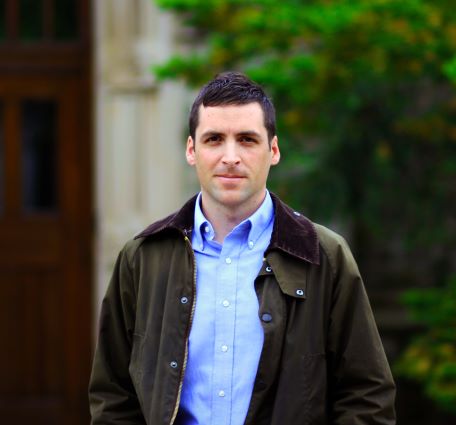Guardianship has long been the traditional way to support decision-making for people living with Alzheimer’s disease and other forms of dementia, but recent research conducted by George Mason University philosophy professor Andrew Peterson investigates an alternative that allows for more autonomy and a greater sense of dignity.

The approach is called supported decision making, and Peterson and his colleagues at the University of Pennsylvania have received a $3.1 million grant funded by the National Institute on Aging to investigate how it can improve health outcomes for people living with Alzheimer’s disease and other forms of dementia. The research is being conducted at the Penn Memory Center, an internationally recognized facility for diagnosis and care for persons living with dementia, where Peterson is an affiliate researcher.
“Dementia is a disease that robs people of their autonomy,” said Peterson, an assistant professor in the Department of Philosophy and Institute for Philosophy and Public Policy. “A serious challenge for people in the early stages of disease is that they usually have mild impairments in only one aspect of decision making. This doesn’t mean that they can’t make decisions, as guardianship would suggest. Rather they just need support from trusted others: if they can’t remember facts from a doctor’s appointment, a care partner can attend and take notes; if they have difficulty deliberating between choices, a care partner can talk them over during morning coffee.”
In a New York Times opinion piece about Britney Spears’ high-profile court-appointed guardianship, Peterson and his fellow researchers wrote that the difference between guardianship and supported decision-making is analogous to the difference between a dictatorship and self-rule. “Unlike guardianship, which creates an all-powerful guardian and strips the subject of the right to make decisions, in supported decision-making, the individual retains final control over key decisions,” they said.
Supported decision making was originally developed for persons living with intellectual and developmental disabilities, but Peterson said the framework holds great promise for people with neurodegenerative disease. The advantage of supported decision making, Peterson said, is its familiarity.
“We often, if not always, make decisions with the advice and support of trusted others, such as friends, family, mentors, and work colleagues,” he said. “This makes our decisions better, even for people with no cognitive problems. Supported decision making formalizes this process so expectations and roles are explicit, and persons living with dementia can maintain their independence for as long as possible.”
Peterson and his colleagues will develop best practices for supported decision making in memory care facilities. Although supported decision making is rapidly gaining traction in the law, there is a paucity of data about the benefits of this approach. Does supported decision making resolve decision making conflict? Do persons living with dementia show improvements in quality of life when using supported decision making? And what role should geriatricians play in facilitating this decision-making process? Peterson and his colleagues aim to answer these questions.
The research team is taking a phased approach. First, they will develop a supported decision-making toolkit. To do this, Peterson and his colleagues are interviewing patients and their care partners, memory care physicians, and law and bioethics experts. From these interviews and consensus process, they will develop a list of needs and plausible best practices for supporting decision making.
In the second phase of the study, the team will conduct a clinical trial, in which some patients and care partners will be encouraged to use supported decision making while others are not. They will compare these groups with outcome measures related to quality of life, life satisfaction, sense of dignity and agency, and decision-making conflict.
By the end of the study, Peterson said they aim to have a supported decision-making guide that can be scaled to other memory centers nationwide, as well as an evidence base that can justify changes to guardianship law.
